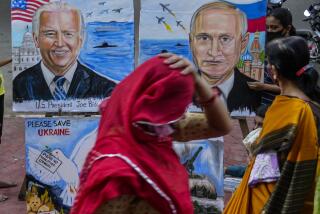Poor Nations Unite Against Subsidies
CANCUN, Mexico â On the eve of global trade talks, a bloc of the worldâs most populous developing nations including China, India and Brazil threatened Tuesday to block any new trade accord unless wealthy nations open their markets to poor countriesâ farm products.
At a news conference here ahead of todayâs opening of the World Trade Organizationâs ministerial conference, the âGroup of 21â developing nations also announced an alliance with Oxfam, the international humanitarian aid and development group, in a bid to rally support from globalization opponents.
The announcement amounts to a bold challenge to the hegemony of the United States and European Union in setting the worldâs trade rules and agenda. The developing countries maintain that they have popular support on their side, as their group represents more than half the worldâs population and two-thirds of its farmers.
The Cancun conference, bringing together representatives of 146 governments, is the latest meeting in the so-called Doha Round of trade negotiations, named after the city in Qatar where talks started in November 2001. They are to be completed by 2005 but have stalled over agricultural issues.
Developing nations want the U.S. and EU to end farm supports and subsidies that make it difficult for poorer countries to sell in their markets. The U.S. and EU give $150 billion annually in direct support to their farmers, according to the World Bank.
The Cancun meeting is the first major trade gathering since China joined the WTO in 2001, and Beijing wasted no time in asserting itself.
âOnly the full consideration of the developing membersâ proposal will mean success for the conference,â said Chinaâs agriculture minister, Du Qinglin. The emergence of a coalition that includes China and India -- longtime rivals on the global stage -- represents a significant step, China experts said.
Still, there was skepticism among analysts that the new Group of 21 alliance could hold in the face of economic pressure that the United States and the EU were sure to apply. The wealthy countries hold the upper negotiating hand simply because their markets, even if only partially accessible, are essential to the poor countriesâ economies.
Margaret Pearson, a China trade expert at the University of Maryland, believes that the Group of 21 is more likely to be a pragmatic, short-term marriage rather than a ânew enduring bloc.â
As China has opened up its economy, its farmers have had to compete against foreign growers and seek out new markets abroad, she said. That makes China more anxious to pry open the worldâs largest markets.
In a boost for the Group of 21, the blocâs position on agriculture has been endorsed by the Cairns Group, a collection of agricultural-exporting countries that have also been agitating for faster liberalization of farm trade rules.
Developing countries have long complained that rich countriesâ farm subsidies not only keep out competition but also unfairly distort exports to other countries, said John Audley, a senior associate at Carnegie Endowment for International Peace.
Critics have singled out government subsidies totaling nearly $4 billion a year to U.S. cotton farmers. The funding eventually works to lower prices for poor African countries whose only cash export crop is cotton, Audley said.
In addition to giants China, Brazil and India, the Group of 21 -- known as the Group of 20 until the recent addition of Egypt -- comprises Argentina, Bolivia, Chile, Colombia, Costa Rica, Cuba, Ecuador, El Salvador, Guatemala, Mexico, Pakistan, Paraguay, Peru, the Philippines, South Africa, Thailand and Venezuela.
More to Read
Sign up for Essential California
The most important California stories and recommendations in your inbox every morning.
You may occasionally receive promotional content from the Los Angeles Times.










